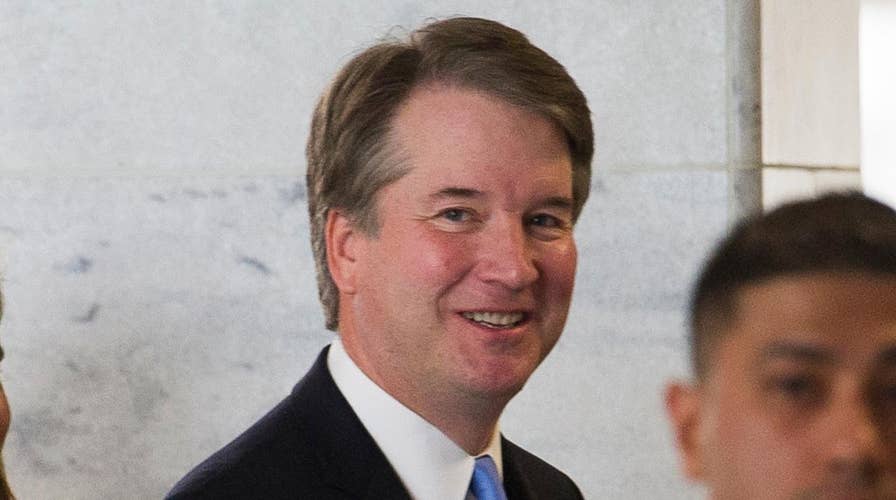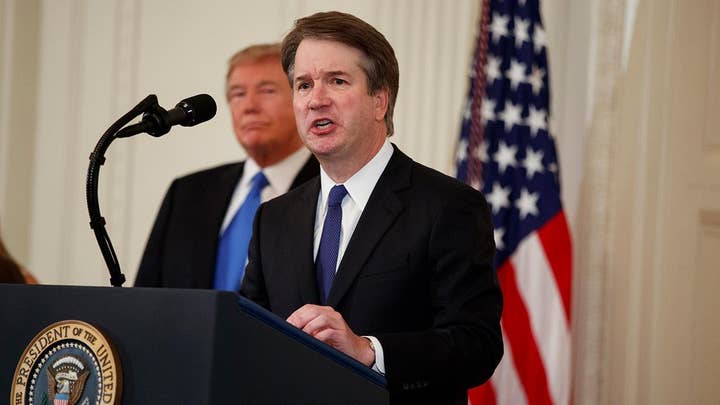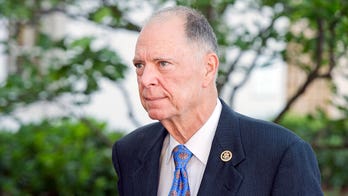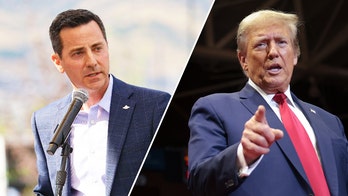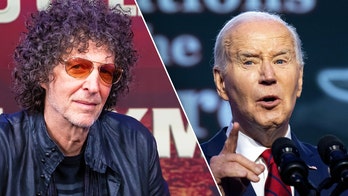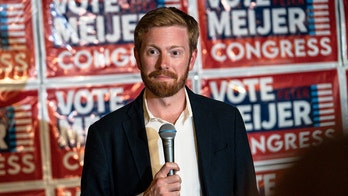Are Dems picking the wrong fight with the Kavanaugh bid?
Sen. Warren says a confirmation is not a 'done deal' as many senators refuse to meet with the Supreme Court nominee; reaction on 'Outnumbered.'
The landscape of presidential nominee coverage is littered with examples of picks who withered under political and media scrutiny, like Harriet Miers under George W. Bush or Tom Daschle under Barack Obama.
Yet a string of would-be media hits on President Trump’s Supreme Court nominee, Brett Kavanaugh, have fizzled on impact -- doing little to dent his image and, in some cases, backfiring on the news outlets that published them.
This includes articles 'exposing' how he spent big bucks on baseball games and, most recently, a detailed New Yorker analysis of his college sports reporting three decades ago -- which quotes one academic, somehow, asserting that Kavanaugh's college basketball articles show he would endorse "unlimited Presidential power" under Trump.
To conservatives, the stories speak to a still-struggling effort to "smear" an otherwise qualified nominee.
“Going forward, this sad smear campaign sets a troubling precedent for future nominees regardless of who the president is,” conservative strategist Chris Barron said.
The New York Times added to the list when it published a recent story on how internal emails show Kavanaugh "helped the [Bush] administration’s effort to win Senate confirmation for one of Mr. Bush’s most disputed judicial nominees," despite testifying in 2006 that nominee Charles W. Pickering Sr. "was not one of the judicial nominees that I was primarily handling."
The piece reflected Democratic questions of whether Kavanaugh had misled the Senate.
However, National Review's David French contacted Pickering, who said the Times did not try to contact him before its report and, further, he didn't remember interacting with Kavanaugh even once during his confirmation fight.
He said in a statement: “While I worked with attorneys in the White House Counsel’s office, I cannot recall a single interaction with Brett Kavanaugh about my judicial nomination. I do not even remember knowing his name at the time. His 2006 testimony is accurate.”
The Daily Wire published a story mocking the Times for the report, writing sarcastically that “they really” got Kavanaugh this time.
“Combine this with his purchase of baseball tickets and love of beer and they might just take this guy down,” the column said.
This was a reference to some other recent hits on Kavanaugh that left barely a scuff.
Last month, The Washington Post was mocked for a report that Kavanaugh racked up credit card debt on Washington Nationals baseball tickets -- even though he paid off the bill. The paper homed in on Kavanaugh incurring “tens of thousands of dollars of credit card debt buying baseball tickets over the past decade” and waited until the fourth paragraph to mention that he paid the bill.
ProPublica then took things a step further last week, soliciting readers to help figure out who attended the games with a headline, “Did You Go to a Washington Nationals Game With Supreme Court Nominee Brett Kavanaugh?” The bizarre post has the subhead, “Trump’s pick is a baseball fan who racked up considerable debt buying season tickets. Help us figure out who went with the nominated judge.”
“Hope, it seems, springs eternal in a newsroom with a political agenda,” National Review’s Thomas Jipping wrote in reaction to the ProPublica’s piece.
NewsBusters Managing Editor Curtis Houck told Fox News that ProPublica’s piece “should go in the dictionary under what a ‘fishing expedition’ looks like.”
Then there's The New Yorker's newly published deep dive on college sports articles Kavanaugh wrote for the Yale Daily News in the mid-1980s -- searching for clues "to how he might rule on critical issues.”
The article asks, "Could there be hints of potential Supreme Court rulings under headlines like ‘Elis Trounce Jaspers’ and ‘Hoopsters Head West?’" The prestigious magazine brought in “experts,” including a veteran Sports Illustrated writer and a professors from Northwestern, Harvard and Yale to explain that his sports articles from three decades ago could foreshadow his position on Supreme Court decisions.
One example was that every college hoops player was described as either “blazing or ice-cold,” which the Sports Illustrated writer said could indicate “a kind of good-evil, hot-cold, Manichean world view.”
“His tendency to approach his stories from the angles set forth by the coach indicates that he doesn’t want to buck authority figures … It would make sense if he supported unlimited Presidential power,” Northwestern’s J. A. Adande also told the magazine.
Further, Harvard Law professor and Obama mentor Laurence Tribe seized on a Kavanaugh description of how a single basketball player can “completely dominate a game.”
Tribe opined in the piece: “Kavanaugh’s seeming fascination with single-player domination might be a muscular view of executive power.”
The Washington Post in July also published a feature on the “elite” world of Kavanaugh. In addition to tales of attending an expensive prep school and living in a nice house, the story noted that Kavanaugh’s neighborhood bartender knew a “a middle-aged guy named Brett who likes to pop in for a Budweiser and a burger” and didn’t have any idea he was a judge.
RedState’s Sarah Rumpf wrote, “Sounds like a very humble, down-to-earth guy,” and suggested the Post’s headline should have been something along the lines of, “SCOTUS nominee so humble he didn’t even tell his favorite bartender he was a lawyer.”
Kavanaugh's confirmation hearing is set to begin after Labor Day.
Democrats are searching through his files for lines of attacks and are sure to dig into his years with the Bush White House, which is how the Pickering controversy arose.
But White House Deputy Press Secretary Raj Shah told the Times that the Democrats were making “increasingly desperate and baseless attacks” when asked about Kavanaugh’s role in Pickering’s nomination. “He met with various lawyers at the White House, but he doesn’t remember meeting or interacting with Kavanaugh even once.”
Kavanaugh's years working for independent counsel Ken Starr are also under the microscope. In the latest article on that era, the Post ran a piece Monday titled, “Brett Kavanaugh memo detailed explicit questions for Clinton.”
The story focused on a 20-year-old memo in which Kavanaugh reportedly opposed giving then-President Bill Clinton a “break” in the Monica Lewinsky investigation. At the time, Kavanaugh reportedly came up with questions for Clinton including, “If Monica Lewinsky says that you inserted a cigar into her vagina while you were in the Oval Office area, would she be lying?”
It's unclear whether this report will damage Kavanaugh either, other than to provide critics fodder to paint the nominee as having a dirty mind or going out of his way to expose a sitting Democratic president for misconduct.
